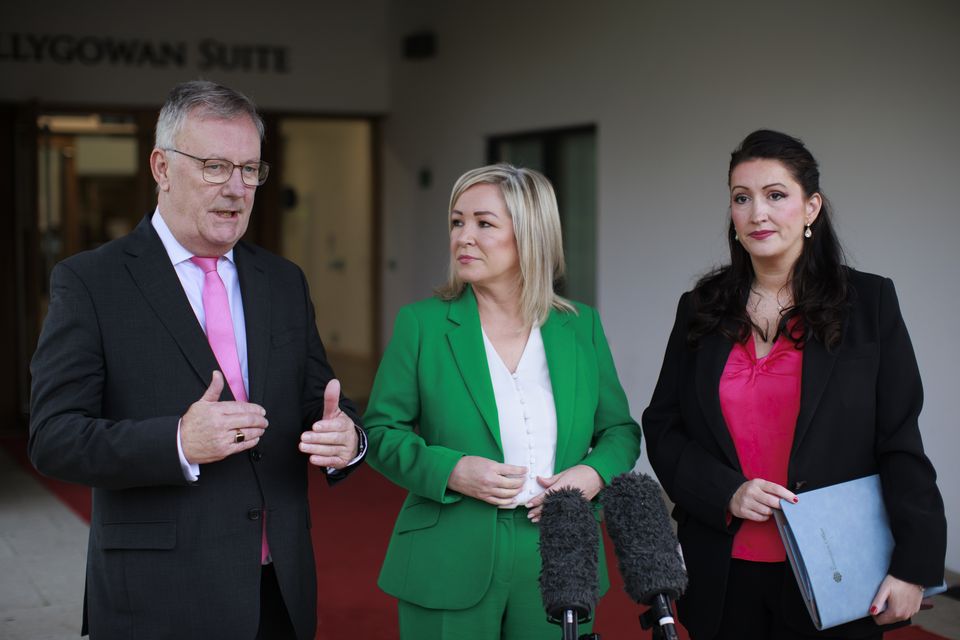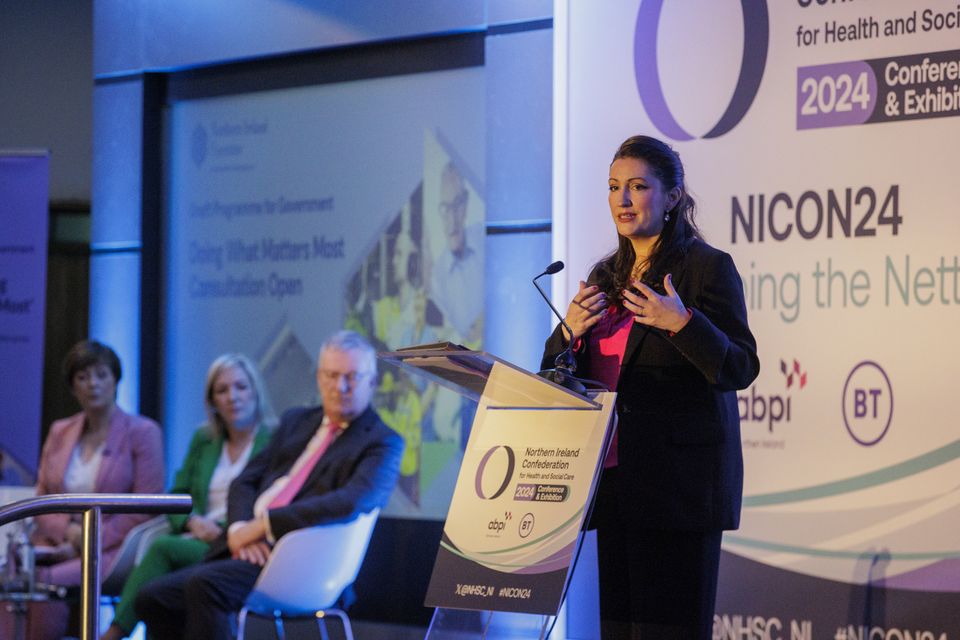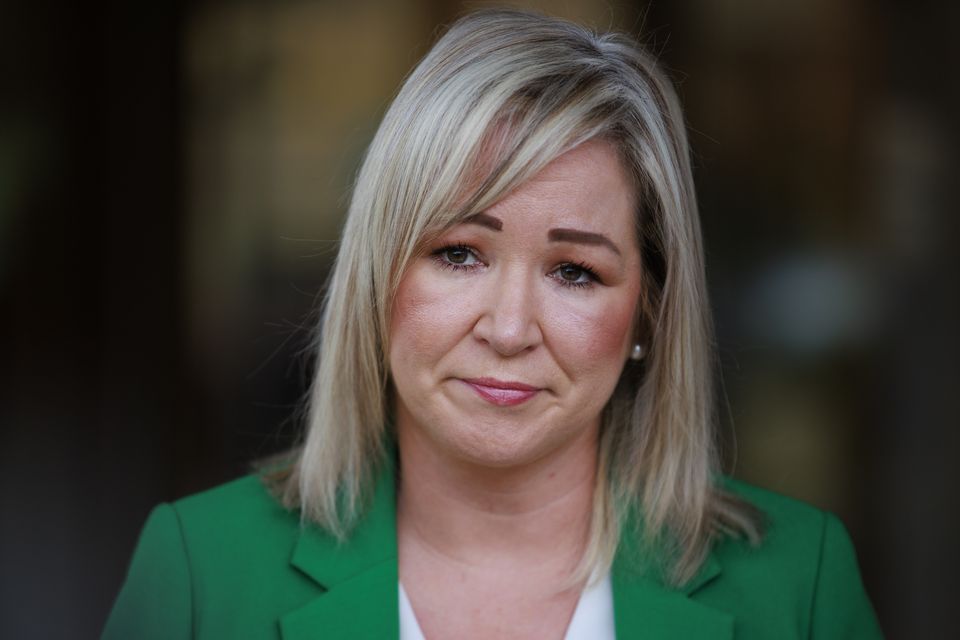All Executive ministers have a role to play in transforming health care provision in Northern Ireland, Stormont’s leaders have said.
That was the central message delivered by First Minister Michelle O’Neill and deputy First Minister Emma Little-Pengelly as they addressed a major conference of healthcare professionals in Belfast.
Ms O’Neill and Ms Little-Pengelly were joined by Health Minister Mike Nesbitt at the Northern Ireland Confederation for Health and Social Care (NICON) conference at the La Mon hotel.
The event brought together hundreds of delegates from across the health and social care sector.
First Minister Michelle O’Neill with deputy First Minister Emma Little-Pengelly and Health Minister Mike Nesbitt during the Northern Ireland Confederation for Health and Social Care conference (Liam McBurney/PA)
The two-day conference was staged at a time when Mr Nesbitt is attempting to add fresh impetus to stalled efforts to reform and restructure the region’s health service.
Northern Ireland has the longest waiting lists in the UK and experts have warned that only a major reconfiguration of treatment provision will improve health outcomes in the longer term.
The first and deputy first ministers told the conference that they were up for the challenge of reform and stressed the need for a joined-up approach to the problem that focused on prevention and addressing health inequalities within society.
“The central message here today is one of partnership, that we want to work together, both in politics across the Executive, and with all of the health and social care family in which to transform our health and social care system,” Ms O’Neill told reporters.
“We know there are many nettles to grasp, but I think the very strong message that we all delivered collectively today is how we want to do this in partnership, that we know that we can deliver better outcomes for people if we all work together.”
Ms Little-Pengelly said Stormont ministers were “on the side” of those working on the front line of the health and social care system.
“There are big challenges ahead,” she said.
“We don’t underestimate the scale of the task ahead, but we wanted to be very clear, and that’s why I think all three of us are here this morning to say that we are on your side, we recognise the need for that transformation, that support, that reform.
“We know it will be a significant piece of work, but there’s also many opportunities with that, and the real opportunity is about improving the health and wellbeing of so many people right throughout Northern Ireland, removing those people from those waiting lists, where too many people are waiting for too long, helping improve the experience that people have when they go to our health service, no matter where or what part.
“But, also, importantly, having that big shift, as the health minister often talks about, towards prevention and tackling those health inequalities that exist there as well.”
Deputy First Minister Emma Little-Pengelly addresses the NICON24 event (Liam McBurney/PA)
Mr Nesbitt welcomed the attendance of the Executive’s leaders.
“I think the fact that the First Minister and deputy First Minister are here underlines the fact that health reform and tackling those health inequalities is an all-Executive issue,” he said.
“And I’m not just delighted that they are here, the whole of the conference is delighted that they are here to underline that message that the Executive is united in wishing to tackle these big issues and deliver better outcomes for our population.”
Ms O’Neill and Ms Little-Pengelly also reiterated the case for securing a better funding model from the UK Government to facilitate some of the planned health reforms.
They said they had made that argument “very strongly” to Prime Minister Sir Keir Starmer and Chancellor Rachel Reeves ahead of the Government’s budget at the end of the month.
“The 31st of October will tell the tale in terms of what the financial allocation might look like but, collectively, we know that we’re not funded according to need,” said Ms O’Neill.
“Collectively, we know we need a proper funding model. We continue to make that case.”
First Minister Michelle O’Neill speaks to media at NICON24 (Liam McBurney/PA)
Ms O’Neill also expressed frustration that uncertainty over longer-term funding meant Stormont would again only be able to set a 12-month budget next year, with ministers having to wait to 2026 to set a multi-year budget.
“We need to quickly get to the point where we’ve got multi-year budgets,” she said.
“It’s not good enough to limp on year by year. The health and social care system can’t plan year by year. They need to be able to plan long into the future. And we hope that we’re obviously confident that we’re going to get to that point, but it is going to take another two years actually to have multi-year budgets as well.”
Ms Little-Pengelly added: “We’re very conscious as well that funding is an essential aspect of this. We’ve made that case very strongly to the Prime Minister and to the Chancellor directly on a number of occasions, including last Friday where we had a very long and I think good session with the Prime Minister, where we outlined all of this.
“But the key message in that is that we need funding in order to invest to transform. This is not the case of simply saying ‘give us more money’ and that goes in the usual direction. This is all about that investment to transform, recognising that we need to do things differently, that we need to run our public services differently in order to make it sustainable.
“So this is very much a two-way street. It is about asking the Chancellor to give us the necessary support, but us also stepping up absolutely across the Executive and across departments to do the necessary work.”


